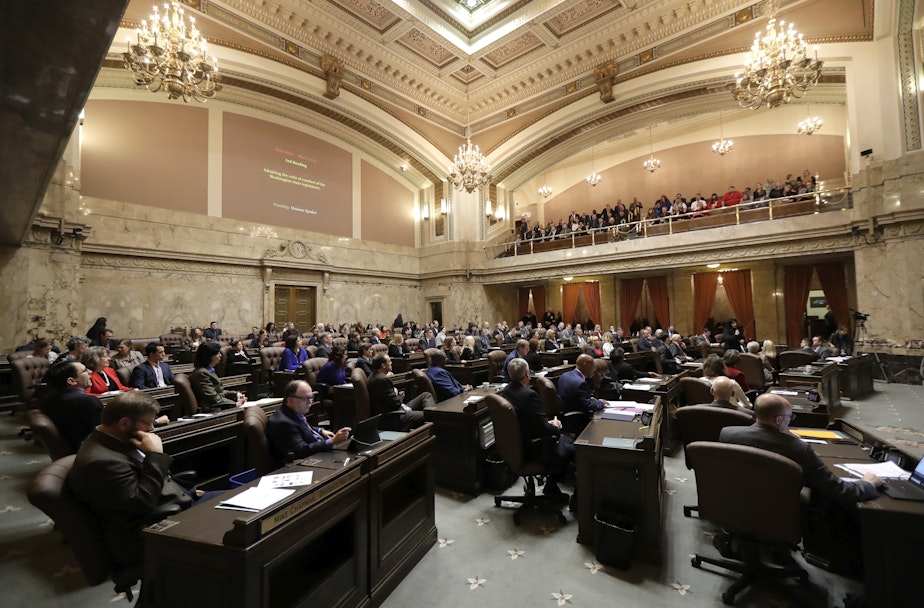700 bills in the Washington Legislature and counting: Which ones will survive?

Halfway through this legislative session, nearly 700 bills have been passed by the Washington House or Senate.
Olympia correspondent Austin Jenkins spoke with KUOW’s Angela King about which ones stand a chance at survival.
Austin Jenkins: So on the list of what's passing: The governor's climate agenda is moving forward, including a clean-electricity-by-2045 bill and a low-carbon fuel standard. The Senate has passed a bill to create a work group that will study how to bring a single payer health care system to Washington state. The Senate also passed a ban on firearms in childcare facilities, similar to the gun free school zones that we already have. And bills to give tenants more rights and more notice of things like eviction and rent increases have also survived to see another day.
Angela King: Give us a sampling of what appears to be dead at this point.
Jenkins: With the caveat that nothing is for sure dead until the last gavel falls — that's my disclaimer — here a couple of examples: a ban on so-called assault weapons and a ban on high-capacity gun magazines, both priorities of Attorney General Bob Ferguson. Democrats in the state Senate tried and failed this week to pass a constitutional amendment to lower the threshold for passing school construction bonds. Bonds currently require a 60 percent vote. And minority Republicans point to bills that they proposed and that died, including one that would have required libraries to adopt Internet safety policies and another that would have banned local governments from enacting tolls.
King: Now on the flip side, a few bills have already made it to the governor's desk.
Sponsored
Jenkins: Correct. Just this week the governor signed a Native American voting rights bill. He signed a bill to move the state's presidential primary up from late May to early March and a bill to create a buyback program for bump stocks. That's the device used by the mass shooter in Las Vegas in 2017.
King: We're heading into the time of the session when we start to see these budget proposals. What are you expecting from the Democrats specifically.
Jenkins: Well, first recall that in December Governor Jay Inslee proposed a two-year $55 billion budget that would be about a $10 billion increase over current spending. The governor's budget may prove the high watermark in terms of spending, that House and Senate Democrats will come in somewhere south of that, probably over $50 billion but not $55 billion.
Democrats are also likely to propose a capital gains tax and they're going to be making the case that new and higher taxes are needed even though we've got a very robust economy right now because there are moral and constitutional obligations the state has to meet. And you're going to hear from Republicans that the state is taking in a lot more in revenue and that taxes aren't needed and that they need to budget within the existing funds they have.
King: We're halfway through the session right now. Do you think lawmakers are going to get out on time April 28?
Sponsored
Jenkins: I'm betting yes. Just because it's one-party rule here. But I don't think it's going to be easy because I think this budget process is going to be difficult for them. The pressure is on Democrats. They don't leave themselves a lot of time, a month essentially to write a very big budget. And they also have to do a capital construction budget and transportation budget. So not a lot of wiggle room. But I get the sense that everyone is hoping for an on-time departure from Olympia this spring after the cherry blossoms of bloom.






